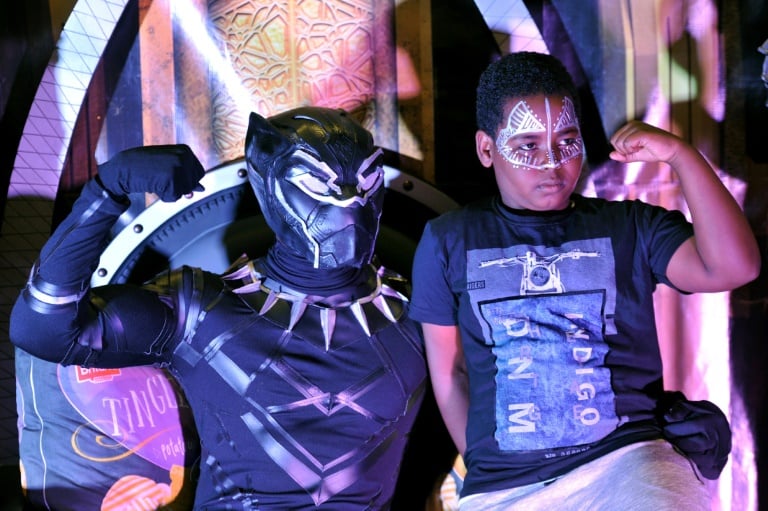For about two weeks in February, the Black Panther film seemed to be the only thing people on the internet cared to speak about.

The film, the hype around which had been brewing since at least 2016, exploded on to the big screen and served as a welcome distraction from school shootings, the resignation of Jacob Zuma and tax hikes.
Hundreds and thousands of South Africans saw the film, and many of them went on social media to share their experience. While a lot has been said and written about the film’s ‘hidden messages’ — the movie is loaded with subtext, including Sankaran philosophies, Pan-Africanist ideas and even the entire story of Shaka Zulu — one of the biggest lessons we can take from it as viewers is that of the importance of strategic public diplomacy.

Erik Killmonger (Michael B. Jordan) and T’Challa/Black Panther (Chadwick Boseman). Photo: Matt Kennedy/Marvel Studios
Broadly speaking, public diplomacy is the cross-national engagement between individuals, governments and corporate and other organisations for various objectives including advocacy, influence and the correction of misperceptions. These engagements take a number of forms, from standard international relations to sporting events. But the most commonly practised, perhaps most effective form of public diplomacy, is the cultural kind. As the term suggests, cultural diplomacy is concerned with the use of artistic expression and the exchanges of people as well cultural artefacts and indicators such as music and film to influence the opinions of other nations in attempts to create a mutual understanding.
And this is exactly what Black Panther was. In case you need a refresher, the film follows the story of King T’Challa of the fictional African nation of Wakanda as he ascends to the throne and fights off powerful enemies from both sides of the kingdom’s border. Praised for its script, acting, action sequences and, mostly, its refreshing portrayal of black people and Africans as something other than criminals, buffoons, mammies, magical negroes and Uncle Toms, Black Panther has since made close to R10 billion, thanks in part to its aggressive marketing campaign, which encompassed social engineering on levels almost on par with a World Cup tournament.
As much as it is an uber-budget superhero flick set in a world where men fly around in suits made of iron and artificial intelligence and Norse gods walk among mortals, Black Panther is a brilliant illustration of how public diplomacy objectives can be implemented in a subtle and strategic way.
See, Wakanda itself is a grand metaphor for how the Black Panther is used to further America’s public diplomacy efforts using film, and therefore culture, as a vehicle. On the surface, Wakanda is a dirt-poor state that could have been one of the African nations mentioned in Trump’s list of ‘shithole’ countries. But the twist is that Wakanda is extremely wealthy and technologically advanced on account of its large deposits of vibranium — a powerful iron ore substance in the Marvel Cinematic Universe.

Fans got to pose with characters from the film “Black Panther” during an event in the Kenyan capital, Nairobi.
Similarly, Black Panther on the surface is a blockbuster movie, but through the film and the larger Marvel Cinematic Universe —which is practically an American institution now — Brand America is being sold to Africa and the African diaspora while African culture is being sold back to America and the rest of the world through the kingdom of Wakanda, a composite of numerous African nations and cultures. This notion is further entrenched by the use of IsiXhosa, its inclusion of African actors in its cast and also by its accompanying soundtrack that featured appearances by five South African artists: Gqom megastar Babes Wodumo, rappers Saudi and Yugen Blakrok and singer Sjava. This serves as a reminder that the diplomatic efforts of governments and other diplomatic actors are essentially doomed if they are one-sided and void of collaboration, inclusion and mutual understanding.
This has been the international community’s biggest gripe with Donald Trump’s one-dimensional approach to foreign affairs and diplomacy, particularly in Africa. The global community as well as African leaders gasped in unison earlier this year when Trump, during a briefing on draft immigration laws, apparently questioned why America should accept immigrants from a few African countries and other Third World states, referring to these nations as ‘shithole’ countries. Trump’s undiplomatic utterances seemed to confirm suspicions about him living in his own world, isolated from the rest of us (excluding maybe North Korea’s Kim Jong-on). Trump’s approach is similar to that of Wakanda’s early in the film. During the first half of Black Panther, Wakanda’s foreign policy is based on isolation and secrecy based on fear and mistrust. The Wakandans understand the power that vibranium has and do not want it to fall into the wrong hands. But by the time the credits role (or after, if we are to be technical), the fictional country has opened itself up to the world and is willing to export its knowledge and resources.
“The illusions of division threaten our very existence. We all know the truth: more connects us than separates us. But in times of crisis the wise build bridges, while the foolish build barriers,” T’Challa tells the United Nations in the post-credits scene.
A country as powerful as the United States understands that its image is one of the most important aspects of its foreign policies on Africa and it is integration that lies at the core of effective cultural and public diplomacy; it is the cross-pollination of ideas and resources that fosters understanding and lessens tensions between nations, particularly Africa-US relations in the era of Donald Trump.






